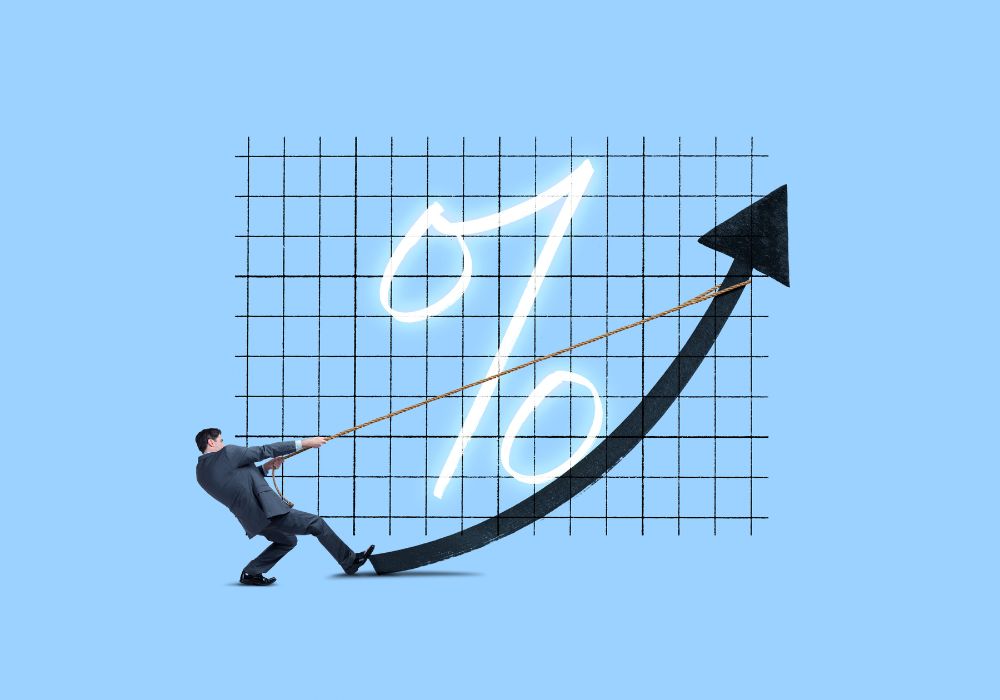Long-term business loans are a crucial financing option for businesses looking to expand operations, invest in new assets, or meet long-term financial goals. However, one key aspect that businesses need to consider when opting for these loans is the interest rates involved. Understanding and analyzing long-term business loan interest rates is essential to make informed financial decisions. In this article, we will take a deep dive into long-term business loan interest rates, their importance, and the factors that influence them. We will also explore the different types of interest rates available, along with valuable tips for getting the best interest rates and managing them effectively. Let’s explore the world of long-term business loan interest rates and how they can impact your business’s financial journey.
Key takeaway:
- Understanding Long-Term Business Loan Interest Rates: It is important to understand the concept of long-term business loan interest rates and how they differ from short-term loans.
- Factors That Influence Long-Term Business Loan Interest Rates: Several factors such as credit score, loan amount and duration, collateral and assets, and business industry and market conditions play a role in determining long-term business loan interest rates.
- How to Get the Best Interest Rates on Long-Term Business Loans: Improving your credit score, providing sufficient collateral, preparing a solid business plan, and comparing offers from different lenders can help secure the best interest rates on long-term business loans.
Understanding Long-Term Business Loan Interest Rates
Understanding long-term business loan interest rates is crucial for any business owner looking to secure financing. The interest rate on a long-term business loan is typically higher than that of a short-term loan due to the longer repayment period. Factors that affect the interest rate include the borrower’s creditworthiness, the loan amount, and the lender’s policies. It’s important to shop around and compare rates from different lenders to ensure you get the best deal.
True story: A small bakery owner named Sarah wanted to expand her business by opening a second location. She applied for a long-term business loan to fund the expansion, but she didn’t fully understand the interest rate. She accepted the first offer she received without exploring other options. As a result, she ended up with a high-interest rate that significantly increased her monthly payments.
Sarah’s bakery struggled to generate enough profit to cover the loan payments, putting her in a difficult financial situation. If she had taken the time to understand long-term business loan interest rates and compare offers from different lenders, she could have found a more favorable rate and avoided the financial strain.
This story highlights the importance of thoroughly understanding long-term business loan interest rates and exploring multiple options before making a decision. By doing so, business owners can make informed choices that support the financial stability and growth of their businesses.

What Are Long-Term Business Loans?
Long-term business loans are financial resources provided by lenders to businesses for an extended period. Unlike short-term loans that are typically repaid within a year, long-term business loans have longer repayment terms, usually ranging from several years to decades. These loans are designed to fund long-term investments such as purchasing assets, expanding operations, or financing large-scale projects.
Long-term business loans differ from short-term loans in terms of the loan duration and repayment structure. While short-term loans are meant to address immediate financial needs or cash flow gaps, long-term loans provide businesses with the capital needed for more substantial and long-lasting ventures. They offer businesses the flexibility to repay the borrowed amount gradually over time, typically in regular installments.
Long-term business loans are crucial for businesses that require substantial funding for growth and development. They provide the financial stability needed to implement expansion plans, invest in new equipment, or hire additional staff. These loans help businesses to seize opportunities, improve competitiveness, and drive sustainable growth.
In history, long-term business loans have played a significant role in fueling economic growth and supporting business development. They have empowered entrepreneurs to bring innovative ideas to life, create jobs, and contribute to the overall progress of industries and economies. By providing access to capital for long-term investments, these loans have been instrumental in fostering entrepreneurial success and driving economic prosperity.

How Do Long-Term Business Loans Differ from Short-Term Loans?
Long-term business loans and short-term loans have several key differences. Here are the main distinctions:
1. Repayment period: Long-term loans offer a longer repayment period compared to short-term loans. While short-term loans are typically repaid within a year, long-term loans can extend for up to 10 or 20 years.
2. Loan amount: Long-term loans generally provide larger sums of money than short-term loans. Lenders are more willing to offer substantial amounts for long-term loans to support business growth or fund significant investments, thanks to the extended repayment period.
3. Interest rates: Long-term loans generally feature lower interest rates than short-term loans. This is due to the longer timeframe that lenders have to earn interest on the loan. Lower interest rates can significantly reduce the overall cost of borrowing for businesses.
4. Purpose: Long-term loans are commonly used for major business expenses, such as equipment purchases, real estate acquisitions, or expansion projects. On the other hand, short-term loans are more suitable for managing day-to-day operations or addressing temporary cash flow gaps.
5. Qualification criteria: Long-term loans often have more stringent qualification criteria compared to short-term loans. Lenders carefully evaluate a business’s financial stability, creditworthiness, and ability to repay the loan over an extended period. Short-term loans may have less stringent requirements, making them more accessible for businesses in need of immediate capital.
Understanding the differences between long-term business loans and short-term loans is crucial in selecting the financing option that aligns with your business’s financial goals and needs.
Why Are Interest Rates Important for Long-Term Business Loans?
Interest rates play a crucial role in long-term business loans because they directly impact the cost of borrowing and, ultimately, the profitability of the loan. It is essential for businesses to understand the significance of interest rates when choosing a long-term loan.
Higher interest rates result in higher monthly repayments, which can pose challenges for businesses in effectively managing their cash flow. Moreover, these higher rates can lead to a substantial amount of interest paid over the loan term, thus increasing the overall cost of the loan.

Conversely, lower interest rates can alleviate the financial burden on businesses and provide them with the opportunity to allocate capital towards other investments or operational expenses. This is particularly advantageous for small businesses or startups that have limited resources.
When considering a long-term loan, it is crucial for businesses to comprehend the interest rates offered by various lenders. Comparing rates from different lenders and evaluating the long-term affordability of the loan is important. Additionally, businesses should factor in their credit history, financial stability, and the terms and conditions provided by the lender.
By understanding the importance of interest rates for long-term business loans, businesses can make informed decisions and select the most suitable loan option for their needs.
Factors That Influence Long-Term Business Loan Interest Rates
When it comes to long-term business loan interest rates, there are several factors that play a crucial role. From credit scores and financial history to loan amount and duration, collateral and assets, and even the specific industry and market conditions, each aspect has a significant impact on the interest rate you’ll be offered. In this section, we’ll dive deep into these different factors, exploring how they influence long-term business loan interest rates and shedding light on what entrepreneurs need to know to make informed decisions.
Credit Score and Financial History
When it comes to long-term business loans, your credit score and financial history are critical factors. Lenders analyze these factors to evaluate your creditworthiness and determine the interest rate they will offer you.
Maintaining a high credit score is crucial as it reflects your responsible financial management. Lenders perceive borrowers with higher credit scores as lower risk, which may result in lower interest rates. Conversely, a poor credit score can lead to higher interest rates or even loan rejection.
Your financial history is also considered by lenders. They will assess your past financial behavior, including loan repayments, bankruptcies, and outstanding debts. A positive financial history showcases your ability to meet your financial obligations, which can positively impact your interest rate.

To improve your credit score and financial history, it is essential to pay your bills on time, reduce outstanding debts, and manage your credit responsibly. By avoiding late payments and maintaining a low credit utilization ratio, you can build a healthier financial profile.
By prioritizing your credit score and maintaining a solid financial history, you increase your chances of securing lower interest rates on long-term business loans. Remember to regularly monitor your credit report and address any errors or discrepancies to ensure accuracy.
Improving your credit score and financial history not only enhances your chances of obtaining favorable loan terms but also cultivates financial proficiency in managing your business finances.
Loan Amount and Duration
The loan amount and duration are crucial factors to consider when obtaining long-term business loans. It is vital to carefully analyze how much money is needed for your business and how long you will require the funds. This information will help determine the interest rates and repayment terms for the loan.
| Factors | Loan Amount and Duration |
| Importance | High |
| Factual Assertion | The loan amount and duration significantly impact the interest rates and repayment terms of long-term business loans. |
| Quantitative Descriptor | The loan amount may vary from small loans of $10,000 to large loans exceeding $1,000,000. The duration can range from 3 years to 20 years, depending on the lender’s policies and borrower’s requirements. |
| Conditions | The interest rates offered may be higher for larger loan amounts, as there is a higher risk involved. Similarly, longer loan durations may also result in higher interest rates. |
Understanding the loan amount and duration is crucial for effectively managing and planning your business’s finances. By carefully considering your funding needs and the time required to repay the loan, you can ensure that you choose a loan that aligns with your business goals and financial capabilities.
Fact: Properly understanding the loan amount and duration can significantly impact the long-term success and financial stability of your business.
Collateral and Assets
| Collateral |
The presence of collateral can significantly impact interest rates for long-term business loans. |
For example, offering real estate, equipment, or inventory as collateral can lower interest rates as the lender has a form of security. On the other hand, if there is no collateral or only limited assets available, lenders may charge higher interest rates to mitigate the perceived risk. |
| Assets |
The value and liquidity of a company’s assets can influence interest rates. |
If a business has valuable assets that can be easily liquidated, such as cash, marketable securities, or accounts receivable, lenders may be more willing to offer lower interest rates. This is because if the borrower defaults, the lender can use the assets to recover their money. Conversely, if the business’s assets are less valuable or not easily converted to cash, lenders may charge higher interest rates to compensate for the additional risk. |
Fact: Collateral and assets play a crucial role in determining the interest rates for long-term business loans. Offering valuable collateral and having liquid assets can help in securing lower interest rates from lenders.

Business Industry and Market Conditions
In the context of long-term business loans, the business industry and market conditions play a crucial role in determining the interest rates. The stability and growth potential of a specific industry and the overall economic conditions can significantly impact interest rates.
Businesses operating in industries with high demand and growth potential often have more favorable interest rates. Lenders view these industries as less risky and are more willing to offer competitive rates. Conversely, businesses in industries facing challenges or experiencing downturns may encounter higher interest rates. Lenders may perceive these industries as riskier, leading to increased borrowing costs.
Market conditions also influence interest rates for long-term business loans. During periods of economic stability and low inflation, interest rates generally remain stable or may even decrease. This can benefit businesses seeking long-term loans by offering lower borrowing costs.
Conversely, in times of economic volatility or inflationary pressures, interest rates are more likely to rise. Lenders adjust their rates to compensate for increased risk, resulting in higher borrowing costs for businesses.
It is essential for businesses to monitor the industry and market conditions when considering long-term business loans. Understanding the current state of the industry and market trends can help businesses make informed decisions regarding their borrowing needs. By staying aware of these factors, businesses can better position themselves to secure favorable interest rates and manage their financial stability.
Note: The information provided is based on general observations and may vary depending on specific circumstances and lending institutions.
Types of Interest Rates for Long-Term Business Loans
When it comes to long-term business loans, understanding the different types of interest rates is crucial. In this section, we’ll dive into the world of interest rates for these loans. Get ready to explore the ins and outs of fixed and variable interest rates and discover which one may suit your business needs best. Prepare to uncover the factors that can impact your interest rate and gain insights into how these rates can influence the overall cost of borrowing. Let’s unravel the mysteries of long-term business loan interest rates together!
Fixed Interest Rates
The sub-topic of fixed interest rates in long-term business loans provides stability and predictability for businesses. Here are some important aspects to consider:
- Fixed interest rates remain constant throughout the loan term, providing businesses with a clear understanding of their repayment obligations.
- With fixed rates, businesses can budget accurately and plan for the future without worrying about unexpected increases in interest expenses.
- This type of interest rate offers protection against market fluctuations and interest rate hikes, providing stability and peace of mind.
- Fixed rates are suitable for businesses that prefer a consistent repayment structure, making it easier to forecast cash flow and manage financial obligations.
- Businesses can negotiate fixed interest rates based on their creditworthiness, financial stability, and the lender’s policies.
To secure the best fixed interest rate for a long-term business loan, businesses should:
- Maintain a high credit score, as a good credit history can help them negotiate lower interest rates.
- Pledge sufficient collateral to minimize the lender’s risk, which can lead to lower interest rates.
- Prepare a comprehensive business plan that showcases the company’s profitability, growth potential, and ability to repay the loan.
- Shop around and compare offers from different lenders to find the most competitive fixed interest rates.
By carefully considering fixed interest rates and taking proactive steps to negotiate the best terms, businesses can better manage their long-term loan repayment and financial stability.

Variable Interest Rates
When considering long-term business loans, it’s essential to keep in mind the dynamics of variable interest rates. These rates have the potential to fluctuate over time, either rising or falling based on market conditions. They are commonly linked to a specific benchmark, such as the prime rate or the LIBOR rate.
While variable rates may initially be lower than fixed rates, there is a risk of them increasing over time, which could lead to higher monthly payments. It’s crucial to carefully evaluate your business’s financial stability and ability to handle potential rate increases before opting for a loan with a variable interest rate.
However, variable rates do offer the advantage of lower interest costs if market rates decrease. Some lenders may also provide a cap or limit on how high the interest rate can go, offering some protection against drastic increases.
Being proactive about monitoring market conditions and staying informed about economic trends can help business owners anticipate potential changes in variable interest rates. Nonetheless, if you prefer more certainty and wish to avoid the risk of rate increases, you may consider a fixed interest rate for your long-term business loan.
How to Get the Best Interest Rates on Long-Term Business Loans
Looking to secure the best interest rates on long-term business loans? Look no further! In this section, we’ll explore effective strategies to help you nab the most favorable terms and conditions. From tips on improving your credit score to understanding the importance of providing sufficient collateral, preparing a solid business plan, and comparing offers from different lenders, we’ve got you covered. Get ready to dive into the world of long-term business loan interest rates and set yourself up for success!
Improve Your Credit Score
To improve your credit score and increase your chances of obtaining better interest rates on long-term business loans, consider the following strategies:
- Pay your bills on time: Ensure that you make timely payments as it shows lenders that you are responsible and trustworthy.
- Reduce your credit utilization: Aim to keep your credit card balances below 30% of your available credit limit to improve your credit score.
- Manage your debts: By paying down outstanding debts and avoiding taking on new debt, you can keep your debt-to-income ratio low and improve your credit score.
- Check your credit report: It is essential to regularly review your credit report for any errors or discrepancies that may be negatively impacting your credit score.
- Build a positive credit history: You can establish a track record of responsible credit usage by maintaining long-standing accounts and making consistent payments, which will improve your credit score.
- Avoid unnecessary credit applications: It is best to only apply for credit when necessary to minimize the small temporary drop in your credit score that can occur with each application.
- Diversify your credit mix: Having a mix of different types of credit, such as credit cards, loans, and a mortgage, can have a positive impact on your credit score.
- Work with a credit counselor: If you are struggling with your credit, seeking guidance from a reputable credit counseling agency can help you create a plan to improve your credit score.

Provide Sufficient Collateral
When applying for a long-term business loan, it is crucial to provide sufficient collateral in order to secure favorable interest rates. To ensure you have adequate collateral, follow these steps:
- Evaluate your assets: Take stock of your business assets, such as real estate, equipment, inventory, or accounts receivable, to determine their value.
- Assess the value: Understand the worth of your assets by determining their market value. If necessary, consider obtaining professional appraisals.
- Choose the right assets: Select assets that hold significant value and can be easily liquidated to recover the loan amount, if needed.
- Prepare documentation: Gather all required documents, including ownership certificates, titles, deeds, and insurance policies, to prove the ownership and value of your assets.
By providing sufficient collateral, you demonstrate to lenders that you have valuable assets to secure the loan. This reduces their risk and increases the likelihood of obtaining lower interest rates.
In addition to providing collateral, there are some suggestions to improve your chances of securing the best interest rates on long-term business loans:
- Improve your credit score by making timely payments and minimizing outstanding debts.
- Create a solid business plan that outlines your goals, strategies, and financial projections.
- Compare offers from different lenders to find the most competitive interest rates and terms.
Prepare a Solid Business Plan
Preparing a solid business plan is crucial when seeking a long-term business loan. A well-crafted business plan can help lenders evaluate the viability and potential success of your business, which in turn can impact the interest rates offered to you.
- Outline your business goals and objectives clearly. This will show lenders that you have a clear vision for your business and a plan for achieving success.
- Include a detailed financial projection. This should cover your projected revenue, expenses, and cash flow for the next few years, providing lenders with a realistic understanding of your business’s financial health.
- Highlight your industry knowledge and expertise. Demonstrating your understanding of the market, competition, and target customers will instill confidence in lenders that you have a solid understanding of your business environment.
- Showcase your management team’s qualifications. Lenders want to see that you have capable individuals leading your business. Highlight the relevant experience, skills, and achievements of your team members.
- Include a comprehensive marketing strategy. Outline how you plan to attract and retain customers, differentiate yourself from competitors, and drive growth in your target market.
- Make sure your business plan is well-structured and easy to follow. Use section headings, bullet points, and clear language to ensure clarity and readability.
A strong business plan not only enhances your chances of securing a favorable interest rate but also demonstrates your commitment and professionalism to lenders. Take the time to prepare a solid business plan that showcases your business’s potential and sets you apart from other loan applicants.

Compare Offers from Different Lenders
When comparing offers from different lenders for long-term business loans, it is important to consider various factors to ensure you are getting the best deal. A table that compares different lenders’ offers can provide a clear picture of the options available.
| Lender | Interest Rate | Loan Amount | Loan Duration | Collateral Required |
| Lender A | 5% | $100,000 | 5 years | Yes |
| Lender B | 4.5% | $150,000 | 7 years | No |
| Lender C | 6% | $200,000 | 10 years | Yes |
- Compare the interest rates offered by different lenders. Lower interest rates can save your business a significant amount of money over the course of the loan.
- Consider your business’s funding needs and the length of time you need to repay the loan. Make sure the loan amount and duration align with your business’s financial goals.
- Some lenders may require collateral, such as property or equipment, to secure the loan. Evaluate whether you have sufficient collateral to meet the lender’s requirements.
By comparing offers from different lenders, you can select the one that offers the most favorable terms for your long-term business loan.
What Are the Average Interest Rates for Long-Term Business Loans?
The average interest rates for long-term business loans can vary depending on various factors such as the borrower’s creditworthiness, the loan amount, and the term of the loan. Below is a table outlining the average interest rates for long-term business loans:
| Loan Term | Average Interest Rate |
| 1-3 years | 5-8% |
| 3-5 years | 6-9% |
| 5-10 years | 7-10% |
| 10+ years | 8-12% |
These rates are only indicative and can vary depending on the lender and the specific circumstances of the borrower. It is important for business owners to shop around and compare offers from different lenders to secure the most competitive rates for their long-term business loans.
In recent history, the average interest rates for long-term business loans have been influenced by various economic factors. For example, during periods of economic growth and low inflation, interest rates tend to be lower. On the other hand, during times of economic recession or high inflation, interest rates can be higher due to increased risk and cost of borrowing for lenders. It is important for business owners to stay informed about the current economic conditions and work with a trusted lender to navigate the borrowing landscape effectively.
Tips for Managing Interest Rates on Long-Term Business Loans
When it comes to managing interest rates on long-term business loans, here are some tips for managing interest rates on long-term business loans to keep in mind:
- Improve your credit score: A higher credit score can often result in lower interest rates on long-term business loans. Make sure to pay your bills on time and keep your credit utilization ratio low.
- Shop around for the best rates: Don’t settle for the first loan offer you receive. Compare interest rates from different lenders to get the best deal on long-term business loans.
- Consider a variable interest rate: While fixed rates provide stability, opting for a variable interest rate can give you the opportunity to benefit from potential rate decreases in the future when managing interest rates on long-term business loans.
- Pay off debt before applying: Having a high debt-to-income ratio can negatively impact your loan terms. Prioritize paying off existing debt before applying for long-term business loans to manage interest rates.
- Negotiate with lenders: Don’t be afraid to negotiate with lenders to get a lower interest rate on long-term business loans. Research current market rates and use that information as leverage during negotiations for managing interest rates.
History has shown that businesses that effectively manage their interest rates on long-term loans are more likely to thrive and grow. By following these tips for managing interest rates on long-term business loans and staying informed about market trends, businesses can position themselves for success and minimize the financial burden of interest payments on their loans.
Some Facts About A Deep Dive into Long-Term Business Loan Interest Rates:
- ✅ Small business loans can be used for various business needs such as purchasing equipment, making payroll, or investing in marketing. (Source: Our Team)
- ✅ Business loans can be short- or long-term, secured or unsecured, and require extensive paperwork and financial information. (Source: Our Team)
- ✅ Personal loans for business use are simpler, with personal financial information and credit history being reviewed. They are typically unsecured and have loan amounts ranging from $1,000 to $50,000 or more. (Source: Our Team)
- ✅ Business loans can help separate business and personal finances, limit personal liability in case of default, and build business credit history and score. (Source: Our Team)
- ✅ The interest rates for SBA 504 loans are tied to the bonds sold to institutional investors, which are typically reflective of 10-year U.S. Treasury bond rates. This allows borrowers to secure long-term, fixed-interest rates competitive with conventional commercial rates. (Source: Our Team)
Frequently Asked Questions
What are SBA small business loan rates and how do they compare to other loan options?
SBA small business loan rates are determined by the current 10-year U.S. Treasury bond rates and can range from 12.5% to 15.75% for fixed-rate loans and 10.5% to 12.5% for variable-rate loans. These rates are typically more affordable compared to other types of financing, such as invoice factoring or merchant cash advances, which can have interest rates ranging from 25% to over 350%. It is important to compare rates and explore different loan options.
What are the growth advantages of SBA 504 loans compared to conventional commercial mortgages?
SBA 504 loans offer long-term, fixed-rate financing for major fixed assets, including owner-occupied real estate and heavy equipment. These loans provide several growth advantages over conventional commercial mortgages. Firstly, 40% of the project cost is financed by the loan, allowing the business owner to retain more capital. Additionally, the financing is done through the sale of public bonds called debentures, resulting in competitive fixed-interest rates over the loan’s duration.
How does the SBA 504 refinance option benefit businesses with existing commercial real estate?
The SBA 504 refinance option allows businesses with existing commercial mortgages to refinance for better terms. By refinancing into an SBA 504 loan, small business owners can potentially secure lower interest rates and free up more money for their business. This option can provide financial relief and improved cash flow.
What are the pros and cons of utilizing invoice financing as an alternative financing option?
Invoice financing, also known as invoice factoring, can be an alternative financing option for small businesses. The advantage of invoice financing is that businesses can obtain quick funding by selling their unpaid invoices to a third-party lender. However, this type of financing often comes with higher interest rates, ranging from 25% to over 350%. It is important to carefully consider the cost and weigh the benefits against the higher interest rates.
How does personal liability factor into the decision between a personal loan and a business loan?
Personal loans for business use typically require the business owner to provide personal financial information and credit history, and they are typically unsecured. While personal loans can be easier to obtain, the business owner may still be personally liable for repayment. On the other hand, business loans can help limit personal liability in case of default, as the business assets are primarily used as collateral for the loan.
How can businesses calculate and understand the effective rate of a loan?
The effective rate of a loan is the total of the interest and fees paid to the bondholder and administrators of the loan. To calculate the effective rate, the borrower can refer to the loan package, which will provide a breakdown of the loan payment, including the principal, interest, and division of fees. It’s important for businesses to carefully review the terms and understand the total cost of the loan before making a decision.


